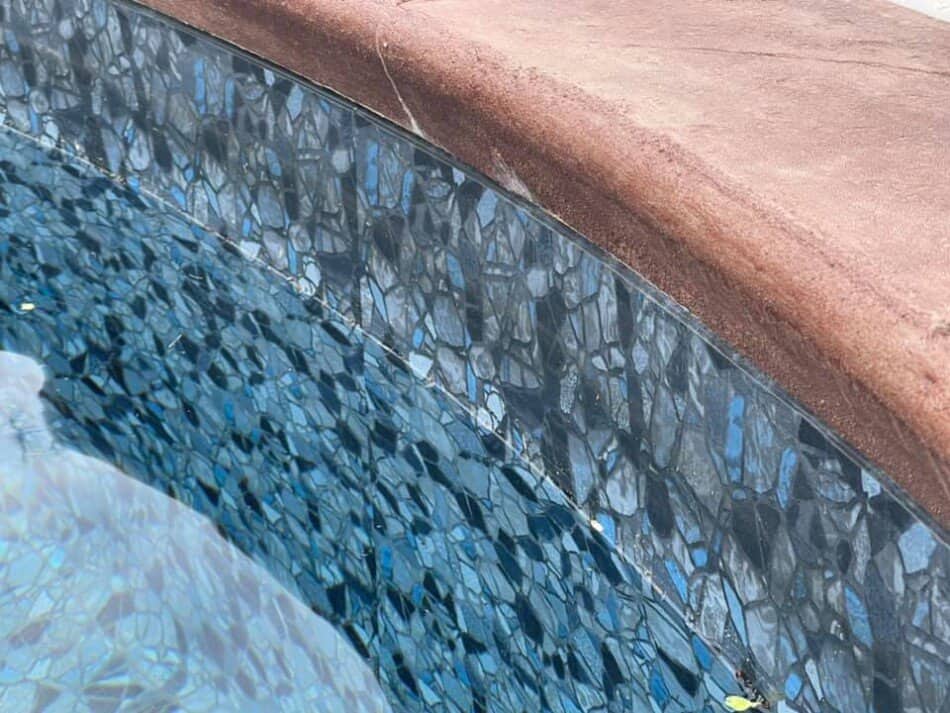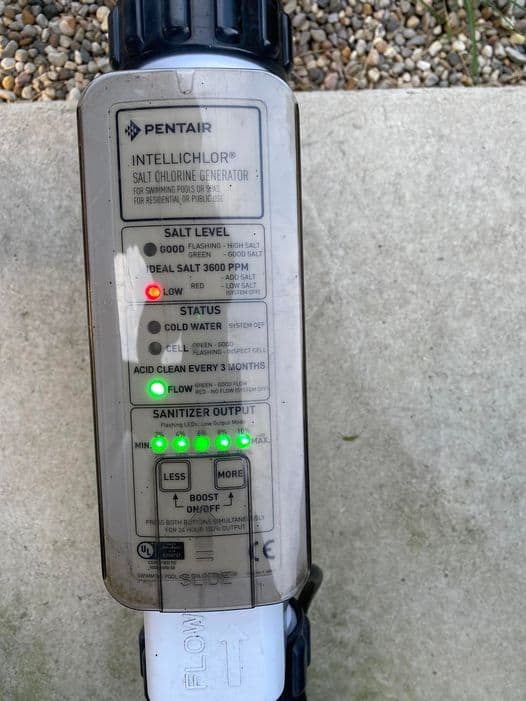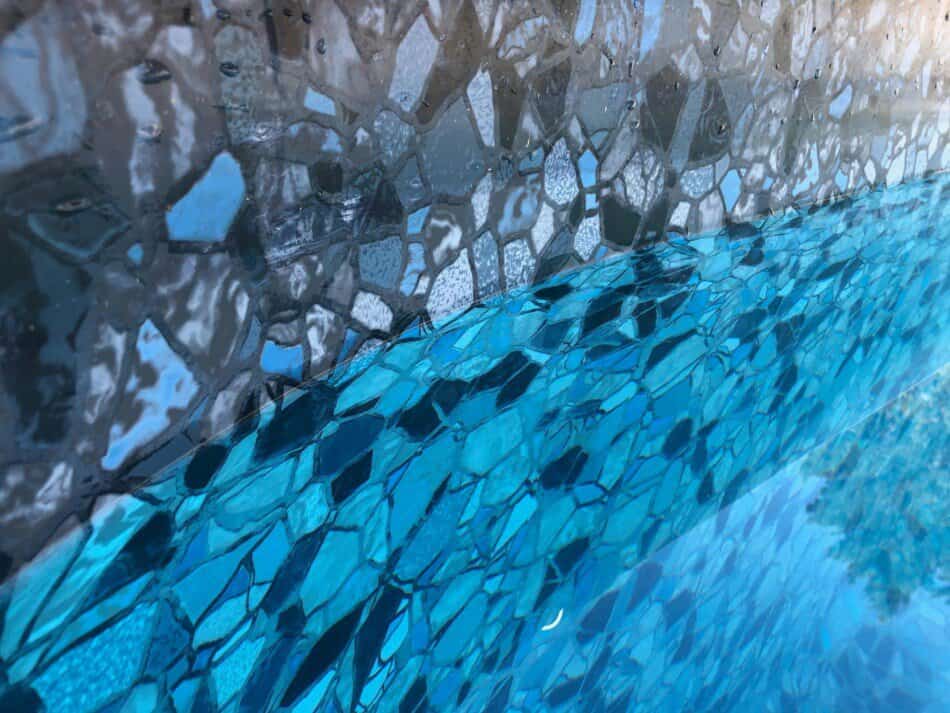Saltwater systems have become extremely popular in recent years. Customers are always getting them on their new pool builds but we typically see these systems in custom Gunite Pools. These systems are great and the customers love them. How about in a Vinyl Liner Pool?
A saltwater system is compatible with a Vinyl Liner Pool if chlorine levels are kept below 1.5ppm. If chlorine levels rise above 1.5ppm, there is a risk of damage to your pool liner and Aluminum Coping. Salt Water systems for Vinyl Liner Pools are a good option if the pool owner can be diligent in maintaining a healthy chemical balance in their pool.
Let’s jump into the specifics of how the chemistry works so you can feel confident in your decision on getting a saltwater system for your pool.
Why a Saltwater System Keeps Your Pool Clean But Doesn’t Destroy Your Vinyl Liner
Firstly, we should address that it’s not actually salt water that is keeping your pool clean but it’s actually chlorine. Saltwater systems use a process called electrolysis which creates Chlorine and Sodium Hydroxide(which is high in pH). This chlorine is actually what is keeping your pool water healthy not the salt.
If your pool never reaches extremely high levels of Chlorine then the deterioration of your pool liner, plumbing, and equipment will not happen quickly. This is not to say it won’t happen, most things exposed to chlorine in healthy pool water will deteriorate over time.
You will need to keep your Chlorine levels under 1.5ppm to prevent destroying your pool liner. If levels reach this high, you run a risk of weakening your liner making it more susceptible to cracks or punctures.
A saltwater system can be a good option for any type of pool but you still have to regularly check your pool water weekly to maintain the proper chemical balance in the pool. You can do this by taking a sample to your local pool supply store or checking your water with a pool and spa water test kit.

As you can see from the image above, a liner can be damaged by too much chlorine in the pool. It can become bleached and faded. When you switch to a salt water system, you should check your pool’s chemical balance right away and possibly every day to get your balance corrected as quickly as possible to prevent these issues from happening.
As mentioned, you should have a solid test kit at your home to be able to run a test at any time to protect your pool’s health and materials. No one is going to be as concerned about your investment as you will be so as a pool owner you have to be prepared to take these steps into your own hands.
How Long Does a Pool Liner Last with Salt Water?
If you are taking good care of your pool liner by keeping your Pool Water Chemically balanced, there should be no effect on the liner’s decline over the years compared to a non-salt water pool.
The actual length of time your liner will last vary greatly on the liner quality, how you have maintained your pool’s chemical balance, and if it has been excessively beaten up during your swim seasons. A liner can last anywhere from 6 years-15 years and having a saltwater pool will not affect that.
Will Salt Water Destroy My Pool Walls and Coping?
Your pool coping, which can be made of aluminum in a vinyl liner pool kit, will have a protective barrier around it to prevent corrosion. That barrier paired with the fact that your pool isn’t incredibly salty(ppm compared to ocean water) will keep the coping from corroding unless the chemical balance in your pool becomes unhealthy.
Vinyl Liner Pools have an option for polymer or fiberglass walls, which are the right choice if you are considering a saltwater system with your vinyl liner pool build. The walls won’t be as strong as steel but it will actually cost a bit less and is a less risky option with a saltwater build.
If you do have Galvanized steel walls, the rust that could build up around these walls may not be significant in weakening the pool wall. But, my recommendation is to avoid steel walls if you are going to choose a saltwater pool system. The years and years of salt build-up around your pool could be significant the years which will corrode the galvanized steel walls.
Also, any potential leak in the liner could pour gallons of salt water onto that galvanized steel which will stay there for years to corrode the steel. Galvanized steel is more salt-resistant than regular steel but it wouldn’t stand up to that type of salt exposure and the logistics of cleaning the steal off of the steal after a leak would be difficult.
How Will Salt Water Effect My Pool Decking?
Saltwater will spill out from your pool onto your deck all through your swimming season. If the water isn’t sprayed off of your deck on a regular basis then you will deal with salt build-up over time which can cause some issues for your decking. The build-up will cause discoloration of your concrete and possibly staining if something made of metal is left on the concrete after touching the salt water.
What are the Biggest Pros and Cons of a Salt Water System in a Vinyl Liner Pool?
The biggest pro of the saltwater system is usually known to most and that comes down to saving money on pool chemicals. You can expect to save a good chunk of cash every year with a Saltwater system because of its constant chlorine production. Savings can be around $500-$600 dollars a year using salt water systems.
The biggest con of the saltwater system is going to be dealing with that constant chlorine production. If you lost track of your chlorine levels with your Saltwater system, you can find your chlorine levels getting too high which could destroy your vinyl liner. You will have to be diligent in maintaining your pool chemical balance as previously mentioned.
Basically, you are going to save money, but in exchange, you will have to keep a sharp eye on those levels to keep your pool from being damaged.
Which Salt Water System Should I Choose for my Vinyl Liner Pool?
There are plenty of options out there when choosing your Salt Water System. We always recommend to our customers the INTELLICHLOR Salt Chlorine Generator by Pentair. While it is easy to install and set up, You should be aware that the lifespan is only about 5 years so you can expect to replace but there is a 2-year warranty from Pentair.

The initial cost to get your Salt Chlorine Generator is going to be a big out-of-pocket expense costing near or above $1000 to purchase. But the savings created over time will add up over multiple swim seasons.

